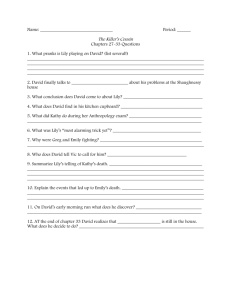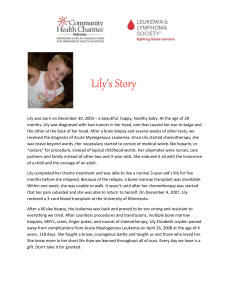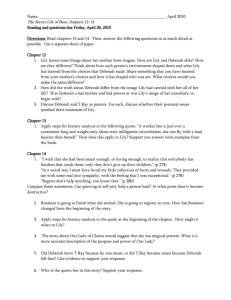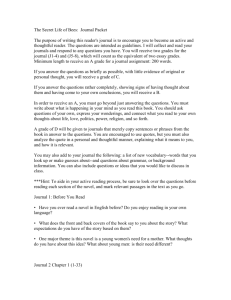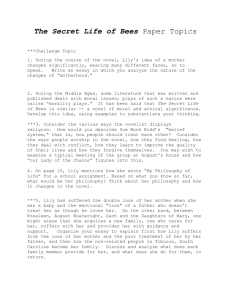Character overview - englishwithmorgan
advertisement
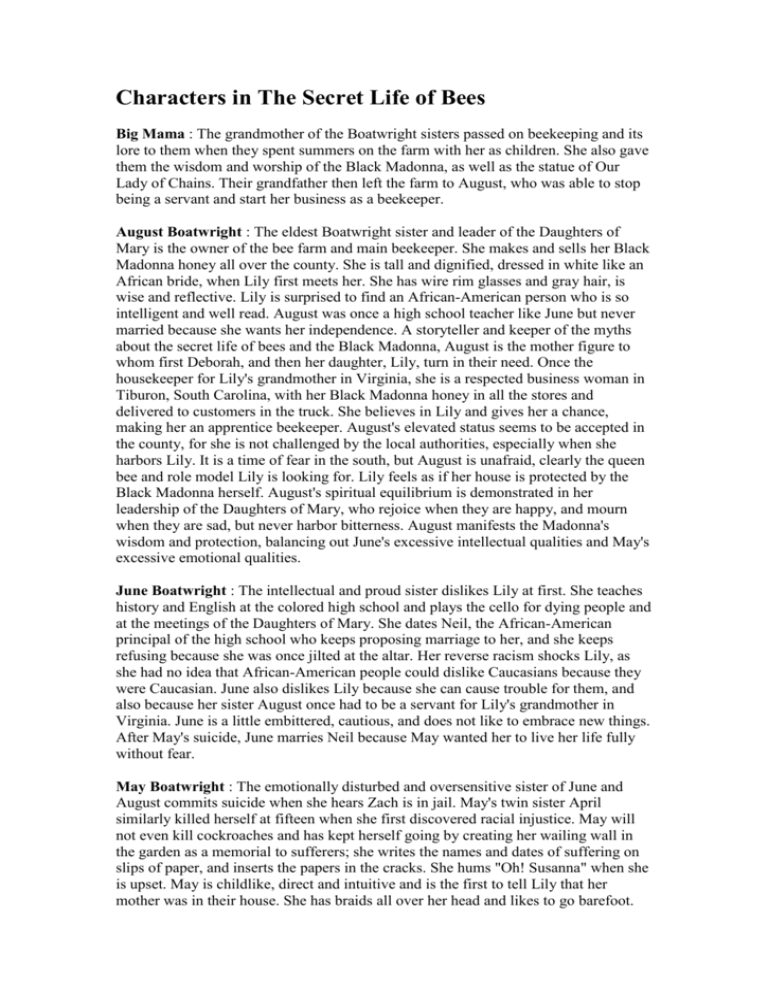
Characters in The Secret Life of Bees Big Mama : The grandmother of the Boatwright sisters passed on beekeeping and its lore to them when they spent summers on the farm with her as children. She also gave them the wisdom and worship of the Black Madonna, as well as the statue of Our Lady of Chains. Their grandfather then left the farm to August, who was able to stop being a servant and start her business as a beekeeper. August Boatwright : The eldest Boatwright sister and leader of the Daughters of Mary is the owner of the bee farm and main beekeeper. She makes and sells her Black Madonna honey all over the county. She is tall and dignified, dressed in white like an African bride, when Lily first meets her. She has wire rim glasses and gray hair, is wise and reflective. Lily is surprised to find an African-American person who is so intelligent and well read. August was once a high school teacher like June but never married because she wants her independence. A storyteller and keeper of the myths about the secret life of bees and the Black Madonna, August is the mother figure to whom first Deborah, and then her daughter, Lily, turn in their need. Once the housekeeper for Lily's grandmother in Virginia, she is a respected business woman in Tiburon, South Carolina, with her Black Madonna honey in all the stores and delivered to customers in the truck. She believes in Lily and gives her a chance, making her an apprentice beekeeper. August's elevated status seems to be accepted in the county, for she is not challenged by the local authorities, especially when she harbors Lily. It is a time of fear in the south, but August is unafraid, clearly the queen bee and role model Lily is looking for. Lily feels as if her house is protected by the Black Madonna herself. August's spiritual equilibrium is demonstrated in her leadership of the Daughters of Mary, who rejoice when they are happy, and mourn when they are sad, but never harbor bitterness. August manifests the Madonna's wisdom and protection, balancing out June's excessive intellectual qualities and May's excessive emotional qualities. June Boatwright : The intellectual and proud sister dislikes Lily at first. She teaches history and English at the colored high school and plays the cello for dying people and at the meetings of the Daughters of Mary. She dates Neil, the African-American principal of the high school who keeps proposing marriage to her, and she keeps refusing because she was once jilted at the altar. Her reverse racism shocks Lily, as she had no idea that African-American people could dislike Caucasians because they were Caucasian. June also dislikes Lily because she can cause trouble for them, and also because her sister August once had to be a servant for Lily's grandmother in Virginia. June is a little embittered, cautious, and does not like to embrace new things. After May's suicide, June marries Neil because May wanted her to live her life fully without fear. May Boatwright : The emotionally disturbed and oversensitive sister of June and August commits suicide when she hears Zach is in jail. May's twin sister April similarly killed herself at fifteen when she first discovered racial injustice. May will not even kill cockroaches and has kept herself going by creating her wailing wall in the garden as a memorial to sufferers; she writes the names and dates of suffering on slips of paper, and inserts the papers in the cracks. She hums "Oh! Susanna" when she is upset. May is childlike, direct and intuitive and is the first to tell Lily that her mother was in their house. She has braids all over her head and likes to go barefoot. She teaches Lily the honey song, "Place a beehive on my grave" that is sung at her memorial vigil. May is the cook and housekeeper of the family. She is overly compassionate, compared to Mary, with her heart on the outside of her chest. Rosaleen Daise : Lily's African-American nanny is a former peach orchard worker in Sylvan, whom T. Ray hires to take care of the house after Deborah's death. Rosaleen is Lily's surrogate mother, and they have a prickly but close relationship. Rosaleen does not go to church, but has made her own religion that is a mixture of nature and ancestor worship. She is rebellious, like Lily herself, and when Rosaleen goes into town to register to vote, gets into trouble with Caucasian men who hassle her. She spits her tobacco juice on their shoes and refuses to wipe it off. She is beaten and thrown in jail, and Lily rescues her and runs away to save her. Rosaleen is special friends with May Boatwright, helping her with cooking and housework. Rosaleen takes May's place after May dies. Daughters of Mary : The Daughters of Mary include neighbors of the Boatwrights in the Tiburon area: Queenie and her daughter, Violet; Lunelle, who makes outrageous hats; Mabalee; Cressie; and one man, Otis Hill and his wife, Sugar-Girl. They are often joined by Neil and Zach. Colorful, cheerful, eccentric and loving, the Daughters are a circle of devotees that worship God as a woman, as Our Lady of Chains, an old slave legend of the Black Mary. They gather in the Boatwright parlor on Sundays and special holidays. Lily thinks they are special and feels honored to be accepted by them. Clayton Forrest : The Caucasian lawyer in Tiburon wears red suspenders and a bow tie. He has sandy hair and blue eyes and a friendly smile. He is a good man, who is a friend of the Boatwrights and takes young Zach under his wing, encouraging him to be a lawyer. He helps out in legal matters, such as clearing Zach, Lily, and Rosaleen of possible legal charges against them. His daughter Becca becomes a friend of Lily and Zach's at the Caucasian high school in Tiburon. It is from making a collect call from Mr. Forrest's office that Lily's father is able to trace her. Avery Gaston : Known as Shoe to the locals, he is the policeman in Sylvan, who appears nice and soft spoken but looks the other way when the Caucasian men come in to beat up Rosaleen in her jail cell. He has the ears of a child, says Lily. Brother Gerald : The pastor of Ebenezer Baptist Church which Lily and T. Ray attend, is bigoted. Rosaleen and Lily rest there on their way to Sylvan when Rosaleen goes to register to vote. Rosaleen, being African-American, was not supposed to be in the church. Brother Gerald said, we love Negroes in the Lord, but they have their own place. It was so hot that Rosaleen stole the fans from the pew, and Brother Gerald was going to press charges against her, but Lily convinced him that Rosaleen was deaf and didn't know better. Miss Lacy : The secretary of lawyer Clayton Forrest is about eighty years old and wears fire-red lipstick. It is clear she does not understand what a Caucasian girl like Lily is doing with the Boatwrights. Lily imagines her spreading the rumor all over town. Willifred Marchant : The famous local author in Tiburon who, Zach says, has won three Pulitzer prizes for her books on deciduous trees of South Carolina. Her books are as esteemed by the Tiburons as the Bible, and every year the schools hold tree planting ceremonies in her name. Lily thinks Zach evokes her as a threat that she will never amount to anything as a writer and cries. Zach comforts Lily, telling her she will be a fine writer. Neil : No last name is given in the book for the tall, African-American high school principal who is courting June. They work at the same school. He fixes things for the Boatwright sisters, such as their truck, and joins in the ceremonies of the Daughters of Mary. Eventually, June gives in and marries him, for this was May's wish before she died. Our Lady of Chains : The old blackened ship's masthead in the parlor of the Boatwright house has the shape of a woman with her fist raised. She is thought to be a Black Madonna. According to legend, she was worshipped as the Virgin Mary by slaves. When taken away by the master and chained up, she miraculously returned to her people each time. She has a sacred heart painted on her chest that is touched during religious services held by the Daughters of Mary. The worship of the statue was passed down by August's grandmother, Big Mama. August, reading about the tradition of Black Mary, used the picture of the Black Madonna of Breznichar, the Bohemian portrait of the Black Virgin, on the honey jars that she sells. She is the Madonna who can release one from bondage, as she gave the slaves hope for freedom and, with her fist raised, represented redress of injustice. Deborah Fontanel Owens : Lily's mother was the pretty daughter of the widow Sarah Fontanel, in Virginia, where August Boatwright was the housekeeper. Deborah was a somewhat dependent only child, and she clung to August as a mother figure. She moved to South Carolina to be near August when her mother died, and there she unhappily married T. Ray Owens when she became pregnant. She ran away from her husband and child when she was having a nervous breakdown and stayed for a time with the Boatwright sisters. She went back to Sylvan to pack and get Lily, but she was accidentally shot before she could return to the Boatwrights. Lily Melissa Owens : The first person narrator and main character is a rebellious and spirited girl of fourteen in the summer of 1964, living with her abusive father, T. Ray, on a peach farm. She is implicated in the accidental shooting death of her mother, Deborah, when she was four years old and has been racked with guilt and longing for her mother ever since. Her birthday, July 4th, is the day her transformation begins, when her African-American nanny, Rosaleen, is arrested for insulting Caucasian men. Lily is likeable for her honest voice and passionate spiritual searching. Like May, she is unusually sensitive to the injustice around her, but she has strength and hope that May does not. Though Lily has inherited a bigoted way of life, she is willing to examine it in herself and change. She has a poetic and spiritual way of seeing the beauty around her. Something of an ugly duckling at home in Sylvan, South Carolina, she blossoms at the home of the Boatwright sisters in Tiburon where she runs away. She thinks she is unattractive but finds out she is pretty like her mother. Lily is smart; her English teacher encourages her to write and read. She keeps journals, making stories of her adventures. Imagination is not for escape for her, but is a means of bringing forth something better in life. As she discusses with Zach, one has to imagine what has never been. This ability is what keeps her from becoming bitter or depressed like her father and mother. Rosaleen tells Lily to quit pretending that the Boatwright home is their home, but because she projects so much of her imagination into living there, it does become their new home. Lily is open to life and to change, and this keeps her moving in the right direction. Her courage is exhibited in the way she gets Rosaleen out of the hospital, and in the way she does not accept a false and cruel life with T. Ray. She refuses to live the hopeless life her mother chose. Though unworldly, she is resourceful and daring when it comes to running away, finding the Boatwrights through pluck and intelligence. Her quest is to find forgiveness and to find mother love, which she does through the Black Madonna. From the beginning, she is given to mystical experiences of places, events, and people. She thinks about God and questions why things are the way they are. Because of this, she receives answers and matures in the course of the novel. Terrence Ray Owens : Lily calls him T. Ray. Lily's mean father was not always mean. Once loving, he became bitter when the wife he adored, Deborah, ran away and then was accidentally killed, leaving him with their young daughter. He takes his anger out on Lily, refusing to give her love or proper attention. He is bigoted, ignorant, and abuses his power as a white man to get his way. A peach farmer in rural South Carolina with little imagination or sympathy for others, he is moderately successful but an unreliable parent; Lily never knows if he is lying to her. She says he is the opposite of Walter Cronkite, who is her symbol for an honest and caring father figure. T. Ray goes after Lily when she runs away, using violence to try to make her return, but he backs down and leaves her alone when the Daughters of Mary stand by her. Jack Palance : A movie star who plans to integrate the theater in Tiburon by showing his movie, accompanied by an African-American woman as his date. This upsets the bigots in town and causes the skirmish between the Caucasian men and Zach's friends. Zachary Lincoln Taylor : Zach is a young African-American man (Lily's age) who works for August, tending the bees on the farm and delivering honey all over the county. He is intelligent and handsome and plans to become a lawyer, even though this was difficult for African Americans at this time. He attends the African-American high school, is an A student, a football player, and likes the jazz musician, Miles Davis, indicating his intellectual tastes. He transfers to a Caucasian high school in the new wave of desegregation. Befriended by Caucasian lawyer Clayton Forrest, who gives him law books and helps him when he is in trouble, Luke is unjustly thrown in jail for something he didn't do, and this injustice is what fuels May's suicide. He is Lily's first boy friend and he encourages her to write. Zach is a model of the young and ambitious African Americans who will emerge from the events of the sixties with new possibilities available to them.
